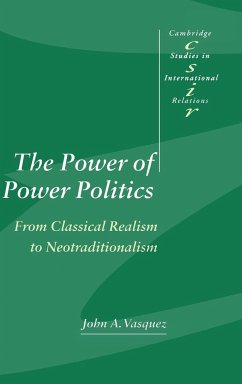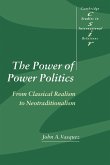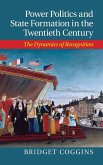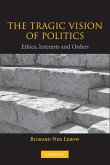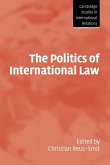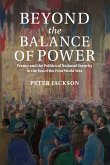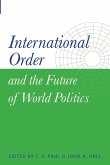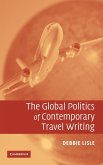In this new and much-expanded edition of his classic study, John Vasquez examines the power of the power politics perspective to dominate inquiry, and evaluates its ability to provide accurate explanations of the fundamental forces underlying world politics. Part I of the book reprints the original 1983 text of The Power of Power Politics. It examines classical realism and quantitative international politics, providing an intellectual history of the discipline and an evaluation of statistical research guided by the realist paradigm. The second part provides six new chapters covering neorealism, post-modernism, the neotraditional research program on balancing, Mearsheimer's analysis of multipolarity and institutionalism, the debate on the end of the Cold War, and neoliberalism. Through the use of comparative case studies these chapters analyse the extent to which the realist paradigm has been progressive (or degenerating), empirically accurate, and remains a relevant and explanatorily powerful theoretical approach for our current era.
Table of contents:
Introduction; Part I. Classical Realism and Quantitative International Politics: 1. The role of paradigms in scientific enquiry: a conceptual framework and a set of principles for paradigm evaluation; 2. The role of the realist paradigm in the development of a scientific study of international relations; 3. Research design: defining and operationalizing the realist paradigm; 4. Theory construction as a paradigm-directed activity; 5. Data making as a paradigm-directed activity; 6. Research as a paradigm-directed activity; 7. Evaluation: the adequacy of the realist paradigm; 8. Theory and research in the 1970s: the emerging anomalies; Part II. Neorealism and Neotraditionalism: International Relations Theory at the Millennium: 9. Retrospective: neorealism and the power of power politics; 10. The promise and potential pitfalls of post-modernism: the need for theory reappraisal; 11. The realist paradigm as a degenerating research program: neotraditionalism and Waltz's balancing proposition; 12. Mearsheimer's multipolar myths and the false promise of realist policy prescriptions: the empirical inaccuracy of the realist paradigm; 13. Challenging the relevance and explanatory power of the realist paradigm: the debate on the end of the Cold War; 14. Conclusion: The continuing inadequacy of the realist paradigm.
This book provides an intellectual history of international relations theory from 1919 to the present. It presents John Vasquez's classic 1983 volume, The Power of Power Politics, analysing classical realism and quantitative international politics, plus six new chapters covering the most important intellectual currents relevant to the debate on realism.
This book provides an intellectual history of international relations theory from 1919 to the present.
Table of contents:
Introduction; Part I. Classical Realism and Quantitative International Politics: 1. The role of paradigms in scientific enquiry: a conceptual framework and a set of principles for paradigm evaluation; 2. The role of the realist paradigm in the development of a scientific study of international relations; 3. Research design: defining and operationalizing the realist paradigm; 4. Theory construction as a paradigm-directed activity; 5. Data making as a paradigm-directed activity; 6. Research as a paradigm-directed activity; 7. Evaluation: the adequacy of the realist paradigm; 8. Theory and research in the 1970s: the emerging anomalies; Part II. Neorealism and Neotraditionalism: International Relations Theory at the Millennium: 9. Retrospective: neorealism and the power of power politics; 10. The promise and potential pitfalls of post-modernism: the need for theory reappraisal; 11. The realist paradigm as a degenerating research program: neotraditionalism and Waltz's balancing proposition; 12. Mearsheimer's multipolar myths and the false promise of realist policy prescriptions: the empirical inaccuracy of the realist paradigm; 13. Challenging the relevance and explanatory power of the realist paradigm: the debate on the end of the Cold War; 14. Conclusion: The continuing inadequacy of the realist paradigm.
This book provides an intellectual history of international relations theory from 1919 to the present. It presents John Vasquez's classic 1983 volume, The Power of Power Politics, analysing classical realism and quantitative international politics, plus six new chapters covering the most important intellectual currents relevant to the debate on realism.
This book provides an intellectual history of international relations theory from 1919 to the present.

